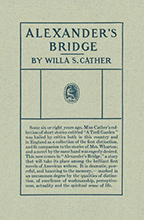A dull, unmoving love affair
Alexander’s Bridge, published in 1912, is the debut novel by Willa Cather. Bartley Alexander is an engineer who, as one might guess, designs bridges. He lives with his wife Winifred in Boston, but his career often involves work in other parts of the world. He is currently working on a major bridge project in Canada, of which much mention is made, but for some reason his job requires spending months at a time in London, without his wife. One one of his trips to England, Alexander hears that a former love from his youth, Hilda Burgoyne, is appearing as an actress in a popular play. The two old flames reconnect and commence having an affair. The rest of the book is basically Alexander feeling bad about the affair as it continues over months and perhaps even years, unbeknownst to his wife.
Cather may be one of America’s great novelists, but Alexander’s Bridge is not one of America’s great novels. A year later Cather would publish O Pioneers! and establish herself as one of the Midwest’s and Southwest’s great regional realists. Alexander’s Bridge, an urban romance set in Boston and London, is not typical of Cather’s work and, although it’s not a terrible piece of writing, doesn’t measure up to her later, greater works.
After reading more renowned works of Cather’s fiction like O Pioneers!, My Ántonia, and One of Ours, one comes to expect realism, honesty, and psychological authenticity in her work. Alexander’s Bridge feels more like a string of soap opera scenes than a realistic look at a love affair. Unlike the realistic down-to-earth characters that one comes to know and care for in Cather’s regionalist novels, he characters in this love triangle are unrealistic ideals of beauty and perfection. Alexander and his two loves are pretentious people engaged in pretentious dialogue that reads more like Literature than actual conversation. The Alexanders live a life of luxury. Mrs. Alexander and Hilda Burgoyne are described as if they were the two most beautiful women of all-time. Is one supposed to sympathize with Alexander’s misgivings as he shuttles back and forth between sleeping with the two? Or is one supposed to envy him? The end result was neither, as I really didn’t care about any of these characters.
The final chapter is the best-written part of the whole book, perhaps because it deals with something other than the love affair and Alexander’s halfhearted crisis of conscience. Nevertheless, it is a predictable ending that one can see coming from chapter one. The whole book feels as formulaic and one-dimensional as so many Victorian romances, except that it deals with adultery in an open and frank way. That’s really the only sense in which the novel could be seen as modern or daring, and it’s not enough to keep the story interesting.
If you liked this review, please follow the link below to Amazon and leave me a “helpful” vote. Thank you.
Cather may be one of America’s great novelists, but Alexander’s Bridge is not one of America’s great novels. A year later Cather would publish O Pioneers! and establish herself as one of the Midwest’s and Southwest’s great regional realists. Alexander’s Bridge, an urban romance set in Boston and London, is not typical of Cather’s work and, although it’s not a terrible piece of writing, doesn’t measure up to her later, greater works.
After reading more renowned works of Cather’s fiction like O Pioneers!, My Ántonia, and One of Ours, one comes to expect realism, honesty, and psychological authenticity in her work. Alexander’s Bridge feels more like a string of soap opera scenes than a realistic look at a love affair. Unlike the realistic down-to-earth characters that one comes to know and care for in Cather’s regionalist novels, he characters in this love triangle are unrealistic ideals of beauty and perfection. Alexander and his two loves are pretentious people engaged in pretentious dialogue that reads more like Literature than actual conversation. The Alexanders live a life of luxury. Mrs. Alexander and Hilda Burgoyne are described as if they were the two most beautiful women of all-time. Is one supposed to sympathize with Alexander’s misgivings as he shuttles back and forth between sleeping with the two? Or is one supposed to envy him? The end result was neither, as I really didn’t care about any of these characters.
The final chapter is the best-written part of the whole book, perhaps because it deals with something other than the love affair and Alexander’s halfhearted crisis of conscience. Nevertheless, it is a predictable ending that one can see coming from chapter one. The whole book feels as formulaic and one-dimensional as so many Victorian romances, except that it deals with adultery in an open and frank way. That’s really the only sense in which the novel could be seen as modern or daring, and it’s not enough to keep the story interesting.
If you liked this review, please follow the link below to Amazon and leave me a “helpful” vote. Thank you.



No comments:
Post a Comment